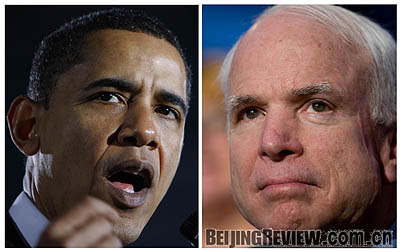|

The U.S. presidential election, scheduled for November 4, has sparked an international frenzy. Now the campaign is full steam ahead amid the financial crisis in the United States and the ensuing economic slowdown. It also involves an African-American presidential candidate and a female vice presidential candidate on opposing tickets, meaning the election will be historic no matter which party wins the White House. Opinion polls have shown that Democratic candidate Barack Obama currently has the upper hand on his Republican rival John McCain. A strong advocate of "change," Obama vows to build up America's national power, reshape its international image and strengthen its global leadership. Countries around the world are closely following the campaign to grasp America's strategies on security and international affairs after the political transition.
In these regards, the next U.S. president will face two daunting challenges: bringing the war on terror to an end and coping with emerging powers. Unlike in previous election campaigns, however, China has not been a hot topic this year. The presidential candidates and their running mates did not play up the China issue in the first two election debates. In this context, Obama and McCain each contributed an article to the China Brief magazine of the American Chamber of Commerce in China in early September, outlining their respective policies toward China.
Bush's legacy
To gain a better understanding of the presidential candidates' policies toward China, it is helpful to review the Bush administration's policy over the past eight years. President George W. Bush's policy toward China is based on the strategic thinking that emerging powers pose potential challenges to America's global and regional supremacy. It aims to integrate China into U.S.-led international and regional systems, make it a "responsible stakeholder" in these systems and prevent it from making any policies or moves that might jeopardize the interests of the United States and its allies.
After the end of the Cold War, the United States attempted to dominate international affairs by relying on the international institutions and rules it had devised. But the pressing problems facing the world today cannot be resolved without the participation of emerging powers. Obama is clearly aware of this. China and Russia are indispensable forces in addressing the challenges of the United States and the world, he said. Now that China has grown into a major economic power, it is unreasonable to deny its participation in efforts to stabilize financial markets, combat terrorism and narrow the wealth divide.
The Bush administration's China policy reflects U.S. policymakers' deep strategic concerns. Along with the worldwide spread of anti-Americanism and the collapse of the Wall Street institutions that symbolized the U.S. model of development, the U.S.-dominated international system is falling apart. As it rises in international standing, China's views have drawn increasing attention at international forums. Its development model and
| 